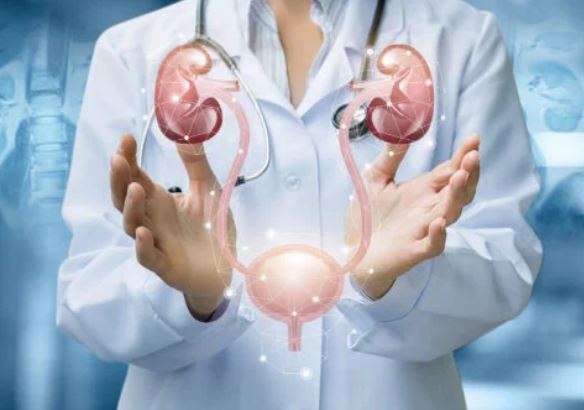Urine infection in the elderly is often not detected by the typical symptoms, but by the changes in behavior of the elderly. The best option is to prevent this condition with simple measures.

Urine infection in the elderly is the most common form of infection in this age segment. It is estimated that at least 10% of men and 20% of women over 65 years of age suffer from it.
The high incidence of urinary tract infection in the elderly is due to the fact that the muscles of the urinary tract walls weaken at advanced ages. This often leads to the urine not being completely evacuated and there is an abnormal amount of germs in that area.
A crucial aspect is the fact that urine infection in the elderly tends to progress silently. In addition, the symptoms are different from those that occur at other ages. For this reason, the infection is often only detected when it is very advanced.
Symptoms of urine infection in the elderly

The symptomatology of urine infection in the elderly differs from its presentation in younger people and, for this reason, it tends to go unnoticed.
Typical symptoms of a UTI include a feeling of urgency to urinate or not having finished urination. There is also often pressure, pain, and burning in the bladder. Urination may be itchy and the urine may have a bad odor or traces of blood.
Aging generates several changes in the immune system. Therefore, urine infection in the elderly usually manifests itself in a different way. It is, above all, important to be attentive to changes in behavior expressed in symptoms such as the following:
Presence of confusion.
Inability to perform tasks that are normally done without problem.
Loss of appetite
Loss of autonomy.
Unexplained drowsiness.
Restlessness or irritability.
Delirium, agitation, hallucinations.
Loss of coordination and motor skills.
Decay and tired when doing the usual tasks.
Symptoms such as sudden incontinence, nausea, and dizziness also occur. If fever appears in the elderly or there is severe pain in the back and kidneys, it is indicated to go to the emergency department.
What are the causes?
Urine infection in the elderly has several causes. One of the factors that most affects the case of older women are hormonal changes. These alter the vaginal flora and favor the proliferation of germs in the urinary tract. Likewise, incomplete emptying of the bladder and the presence of spots in the perineum play a role.
In the case of men, the infection is usually associated with a pathology of the prostate. The main causes in men are an enlarged prostate, added to the narrowing of the urethra. Kidney stones can also be a cause of infection.
In both men and women there is a deterioration of the film that protects the bladder depending on age. This leads to a decrease in the acidity of the urine and favors the urinary tract infection.
Risk factor’s
Age itself is one of the risk factors for urinary infection in the elderly. As already noted, there are several anatomical changes that favor this type of pathology. Also, the weakening of the immune system helps in this.
That said, it is also important to add that there are some elderly people who are more prone to infection. The factors that affect this are the following:
Have benign prostatic hyperplasia.
Drink little water.
Use a catheter to empty the bladder.
Having kidney stones.
Have diabetes
Having urinary or bowel incontinence.
Immobility.
Having had surgery in any area around the bladder.
Having dementia
Have a prolapsed bladder.
Having bacterial prostatitis.
Diagnostic tests
Urine infection in the elderly can be diagnosed with a simple urinalysis. This is usually ordered based on the presence of symptoms that suggest infection. After confirming the diagnosis, a culture is usually ordered to determine the type of bacteria causing the infection.
It must be said that older adults usually have bacteria in their urine without causing any problems or symptoms. This condition is known as asymptomatic bacteriuria. It almost always resolves itself, without the need for any treatment.
Treatment of urinary infection in adults

Faced with the presence of a urine infection in the elderly, the doctor will indicate the use of antibiotics.
The first-line treatment for urinary tract infection in the elderly is the use of antibiotics. However, it is always important to be cautious with this. Many experts recommend starting with a narrow-spectrum antibiotic to avoid the risk of antibiotic resistance.
Also, narrow-spectrum antibiotics have fewer side effects. Special caution must be exercised if the older adult has chronic kidney disease or suffers from hypertension. It is in those cases when the wrong antibiotics can cause serious side effects.
Prevention and recommendations
The best option is to prevent urine infection in the elderly. To do this, there are several measures that are almost always very effective:
Drink a lot of water. It is a simple formula, easy to apply and very effective.
Healthy diet. A balanced diet strengthens the immune system. Blueberries would help prevent cystitis.
Empty the bladder properly. You don’t have to put up with the urge to urinate. If urine is retained, it favors the proliferation of germs. If there are mobility problems, the right thing to do is ask for help to empty your bladder frequently.
Use quality compresses. If there is incontinence and therefore pads are used, ideally they should be breathable.
Feminine hygiene Women should wipe themselves from front to back after urinating. It is advisable to wash your genitals well every day and after having sex.
Avoid excessive genital grooming and the use of irritating soaps.
Change frequently. In cases of incontinence, pads should be changed frequently and also underwear, if it becomes contaminated with urine.
Do not use douches.
Bladder catheterization. If urinary catheters are used, the risk of urinary infection in the elderly is high. Care must be taken, hygiene, and the duration of its use must be minimized.
Prevent urine infection in the elderly, the best solution
It is important that people who are in charge of the elderly are aware of preventive measures. This is the best way to avoid urine infection in the elderly and, likewise, prevent serious consequences.
Whenever there are symptoms of a urinary infection, a doctor should be consulted. If not treated in time, it could spread to the kidneys and bloodstream. In the latter case, there could be a risk of dying.





